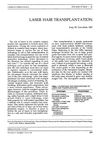 April 2020 in “Online journal of complementary & alternative medicine”
April 2020 in “Online journal of complementary & alternative medicine” Some medications can help increase sexual desire and function in women.
1 citations,
February 2022 in “Journal of the American Academy of Dermatology” Taking biotin supplements can be risky and often lacks evidence of effectiveness for skin, hair, and nail issues.
 November 2023 in “International journal of Ayurveda and pharma research”
November 2023 in “International journal of Ayurveda and pharma research” The herbal hair oil effectively promotes hair growth, nourishes the scalp, and prevents dandruff.
8 citations,
November 2023 in “Social Science & Medicine” Gendered social factors, not just biology, contribute to sex differences in adverse drug events.
September 2022 in “International Journal of Impotence Research” Public interest in finasteride's sexual side effects has significantly increased.
 5 citations,
July 2019 in “Journal of Cutaneous Medicine and Surgery”
5 citations,
July 2019 in “Journal of Cutaneous Medicine and Surgery” Isotretinoin may cause hair loss, especially in women and young adults.
 August 2024 in “medRxiv (Cold Spring Harbor Laboratory)”
August 2024 in “medRxiv (Cold Spring Harbor Laboratory)” Finasteride has various adverse effects, including sexual dysfunction and mental health issues, which vary by age and gender.
 2 citations,
August 2013 in “The Lancet. Diabetes & endocrinology”
2 citations,
August 2013 in “The Lancet. Diabetes & endocrinology” The FDA rejected a testosterone drug again due to safety concerns.
April 2016 in “CRC Press eBooks” Biotechnology could lead to new hair growth products.
2 citations,
June 1979 in “JAMA” Synthetic hair implants are dangerous and can cause severe infections.
Public awareness of finasteride's sexual side effects has increased, suggesting healthcare providers should discuss these risks more thoroughly with patients.
1 citations,
January 2022 in “Journal of The American Academy of Dermatology” Direct-to-consumer teledermatology platforms have financial conflicts of interest and lack proper patient care and follow-up.
The FDA did not approve a testosterone drug because of safety concerns.
 42 citations,
July 2015 in “Cosmetics”
42 citations,
July 2015 in “Cosmetics” Nanotechnology improves hair care products by enhancing ingredient stability, targeting treatment, and reducing side effects, but more research on its toxicity is needed.
 February 2013 in “Journal of The American Academy of Dermatology”
February 2013 in “Journal of The American Academy of Dermatology” Using hair loss drugs finasteride and dutasteride may cause sexual side effects.
 4 citations,
January 2021 in “Dermatologic Therapy”
4 citations,
January 2021 in “Dermatologic Therapy” AI is effective in diagnosing and treating hair disorders, including detecting hair loss and scalp conditions with high accuracy, but it should supplement, not replace, doctor-patient interactions.
 4 citations,
November 2020 in “Journal of Cosmetic Dermatology”
4 citations,
November 2020 in “Journal of Cosmetic Dermatology” Most Facebook posts about hair loss treatments are promotional and not medically supported, with better quality information found on YouTube.
September 2021 in “World journal of urology” The correction states that the label change for Finasteride was in 2012, leading to more reports of side effects from non-healthcare people.
 December 2010 in “Dermatologic Surgery”
December 2010 in “Dermatologic Surgery” Finasteride's effectiveness on the frontal hair loss area is not well-studied or confirmed.
 10 citations,
July 1997 in “Dermatologic Clinics”
10 citations,
July 1997 in “Dermatologic Clinics” Laser hair transplantation can be effective but should be limited to small areas and requires more training to ensure safety and effectiveness.
 6 citations,
September 2018 in “Journal of Dermatological Treatment”
6 citations,
September 2018 in “Journal of Dermatological Treatment” LLLT devices for hair loss need more research to define proper guidelines.
 19 citations,
August 2007 in “Seminars in Plastic Surgery”
19 citations,
August 2007 in “Seminars in Plastic Surgery” Newer skin resurfacing lasers reduce damage and scarring, with some approved for safe use and minimal side effects.
 August 2018 in “Journal of The American Academy of Dermatology”
August 2018 in “Journal of The American Academy of Dermatology” Finasteride use for hair loss is linked to an increased risk of suicidal thoughts and a higher risk of suicide.
Microneedling may be an effective treatment for pattern hair loss.
 April 2015 in “Reactions Weekly”
April 2015 in “Reactions Weekly” Finasteride toxicity information is limited, poor quality, and biased.
April 2023 in “European urology open science” Urologists should screen for mental health issues before and during finasteride treatment.
 28 citations,
January 2017 in “Critical Reviews in Therapeutic Drug Carrier Systems”
28 citations,
January 2017 in “Critical Reviews in Therapeutic Drug Carrier Systems” Nanomaterials in biomedicine can improve treatments but may have risks like toxicity, needing more safety research.
7 citations,
January 2010 in “Research journal of pharmaceutical, biological and chemical sciences” Herbal medicines can be effective alternatives for treating hair loss.
 33 citations,
April 2009 in “Journal of the American College of Certified Wound Specialists”
33 citations,
April 2009 in “Journal of the American College of Certified Wound Specialists” Bidirectional barbed sutures are effective and can reduce surgery time, with a low infection rate and potential cost savings despite being more expensive.
July 2024 in “European Journal of Medicinal Chemistry” New small molecule drugs could help treat hair loss.

















